(完整版)不定代词用法归纳
关于不定代词的用法
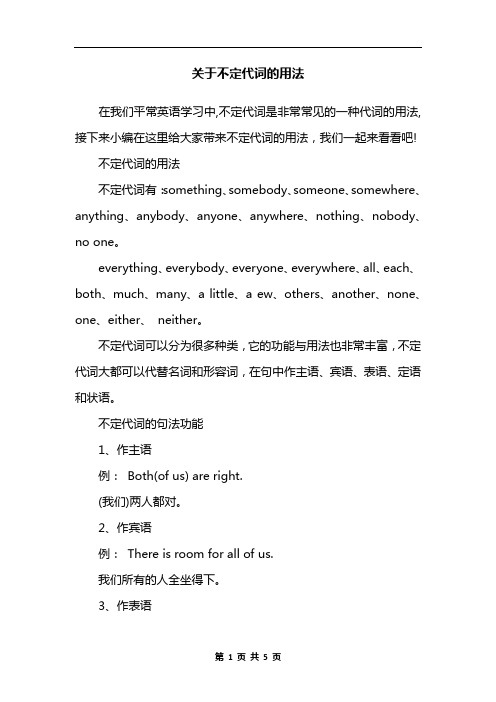
关于不定代词的用法在我们平常英语学习中,不定代词是非常常见的一种代词的用法,接下来小编在这里给大家带来不定代词的用法,我们一起来看看吧!不定代词的用法不定代词有:something、somebody、someone、somewhere、anything、anybody、anyone、anywhere、nothing、nobody、no one。
everything、everybody、everyone、everywhere、all、each、both、much、many、a little、a ew、others、another、none、one、either、neither。
不定代词可以分为很多种类,它的功能与用法也非常丰富,不定代词大都可以代替名词和形容词,在句中作主语、宾语、表语、定语和状语。
不定代词的句法功能1、作主语例:Both(of us) are right.(我们)两人都对。
2、作宾语例:There is room for all of us.我们所有的人全坐得下。
3、作表语例:Thats nothing.没什么。
4、作定语例:You may take either road.两条路你走哪条都行。
向左转|向右转扩展资料1、除every 和no外,不定代词既可用作名词,也可用作形容词。
every和no在句中只能作定语.例如:I have no idea about it.我没有任何主意。
2、all指三者以上,是都的意思。
all的单复数由它所修饰或指代的名词的单复数决定。
例如:All goes well.一切进展得很好。
all 通常不与可数名词单数连用,如:不说all the book,而说the whole book.但all可与表时间的可数名词单数连用,如all day,all night,all the year;但习惯上不说all hour,all century.all还可以与一些特殊的单数名词连用,如all China,all the city,all my life,all the way.3、both都,指两者。
不定代词的用法
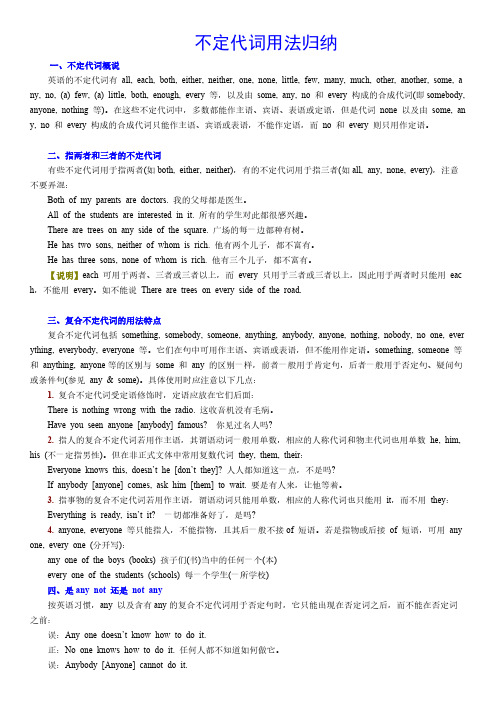
不定代词用法归纳一、不定代词概说英语的不定代词有all, each, both, either, neither, one, none, little, few, many, much, other, another, some, a ny, no, (a) few, (a) little, both, enough, every 等,以及由some, any, no 和every 构成的合成代词(即somebody, anyone, nothing 等)。
在这些不定代词中,多数都能作主语、宾语、表语或定语,但是代词none 以及由some, an y, no 和every 构成的合成代词只能作主语、宾语或表语,不能作定语,而no 和every 则只用作定语。
二、指两者和三者的不定代词有些不定代词用于指两者(如both, either, neither),有的不定代词用于指三者(如all, any, none, every),注意不要弄混:Both of my parents are doctors. 我的父母都是医生。
All of the students are interested in it. 所有的学生对此都很感兴趣。
There are trees on any side of the square. 广场的每一边都种有树。
He has two sons, neither of whom is rich. 他有两个儿子,都不富有。
He has three sons, none of whom is rich. 他有三个儿子,都不富有。
【说明】each 可用于两者、三者或三者以上,而every 只用于三者或三者以上,因此用于两者时只能用eac h,不能用every。
如不能说There are trees on every side of the road.三、复合不定代词的用法特点复合不定代词包括something, somebody, someone, anything, anybody, anyone, nothing, nobody, no one, ever ything, everybody, everyone 等。
不定代词的用法归纳
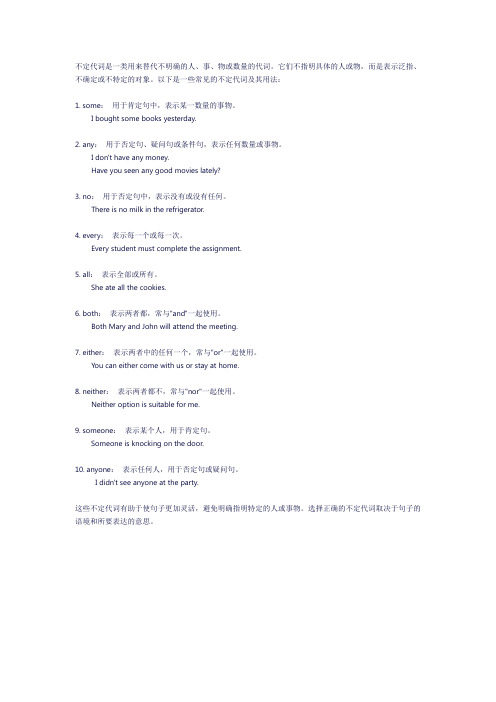
不定代词是一类用来替代不明确的人、事、物或数量的代词。
它们不指明具体的人或物,而是表示泛指、不确定或不特定的对象。
以下是一些常见的不定代词及其用法:1. some:用于肯定句中,表示某一数量的事物。
I bought some books yesterday.2. any:用于否定句、疑问句或条件句,表示任何数量或事物。
I don't have any money.Have you seen any good movies lately?3. no:用于否定句中,表示没有或没有任何。
There is no milk in the refrigerator.4. every:表示每一个或每一次。
Every student must complete the assignment.5. all:表示全部或所有。
She ate all the cookies.6. both:表示两者都,常与"and"一起使用。
Both Mary and John will attend the meeting.7. either:表示两者中的任何一个,常与"or"一起使用。
You can either come with us or stay at home.8. neither:表示两者都不,常与"nor"一起使用。
Neither option is suitable for me.9. someone:表示某个人,用于肯定句。
Someone is knocking on the door.10. anyone:表示任何人,用于否定句或疑问句。
I didn't see anyone at the party.这些不定代词有助于使句子更加灵活,避免明确指明特定的人或事物。
选择正确的不定代词取决于句子的语境和所要表达的意思。
不定代词
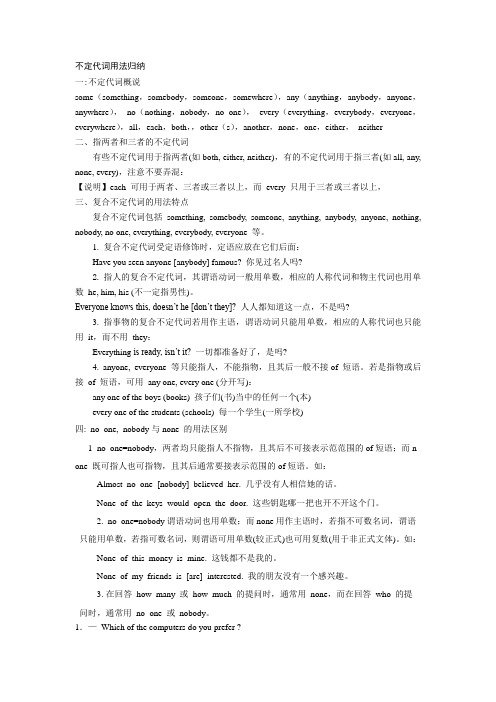
不定代词用法归纳一:不定代词概说some(something,somebody,someone,somewhere),any(anything,anybody,anyone,anywhere),no(nothing,nobody,no one),every(everything,everybody,everyone,everywhere),all,each,both,,other(s),another,none,one,either,neither二、指两者和三者的不定代词有些不定代词用于指两者(如both, either, neither),有的不定代词用于指三者(如all, any, none, every),注意不要弄混:【说明】each 可用于两者、三者或三者以上,而every 只用于三者或三者以上,三、复合不定代词的用法特点复合不定代词包括something, somebody, someone, anything, anybody, anyone, nothing, nobody, no one, everything, everybody, everyone 等。
1. 复合不定代词受定语修饰时,定语应放在它们后面:Have you seen anyone [anybody] famous? 你见过名人吗?2.指人的复合不定代词,其谓语动词一般用单数,相应的人称代词和物主代词也用单数he, him, his (不一定指男性)。
Everyone knows this, doesn’t he [don’t they]? 人人都知道这一点,不是吗?3. 指事物的复合不定代词若用作主语,谓语动词只能用单数,相应的人称代词也只能用it,而不用they:Everything is ready, isn’t it? 一切都准备好了,是吗?4. anyone, everyone 等只能指人,不能指物,且其后一般不接of 短语。
(完整版)不定代词用法总结及配套练习题

不定代词用法总结1) some, any的用法some和any通常用于表示不定数或不定量,修饰复数可数名词或不可数名词。
some表示“几个;一些;部分”,多用于肯定句;而any表示“一些;什么;任何;”,对用于否定句或疑问句中。
如:* He asked me some questions. (他问了我几个问题。
)* Some of the bread has been eaten. (面包已吃了一些。
)* Are there any stamps in this post office? (这个邮局里有邮票吗?)1. "Would you like _____ more coffee?" (some/any) -------"Yes, please."2. I wonder if _____ will show up at the meeting. (someone/anyone)3. Doesn't _____ know the answer to this question? (someone/anyone)4. On TV _____ said that smoking does not cause lung cancer. (someone/anyone)5. (annoyed and emphatic) How can _____ tell such a pack of lies ? (someone/anyone)6. It must be difficult to live without _____ money. (some/any)7. Have you seen my shoes? I can't find them _____. (somewhere/anywhere)8. - "Can you believe we've run out of milk!"- "Would you like me to get _____ at the nearest shop?" (some/any)9. _____ say the Internet is just a hype and that it will blow over. (Some/Any)10. _____ day peace will come to Northern Ireland. (Some/Any)2) 复合不定代词的用法a. 不定代词some, any, no与-one, -body, -thing可以组成九个复合代词。
(完整版)不定代词用法一览表
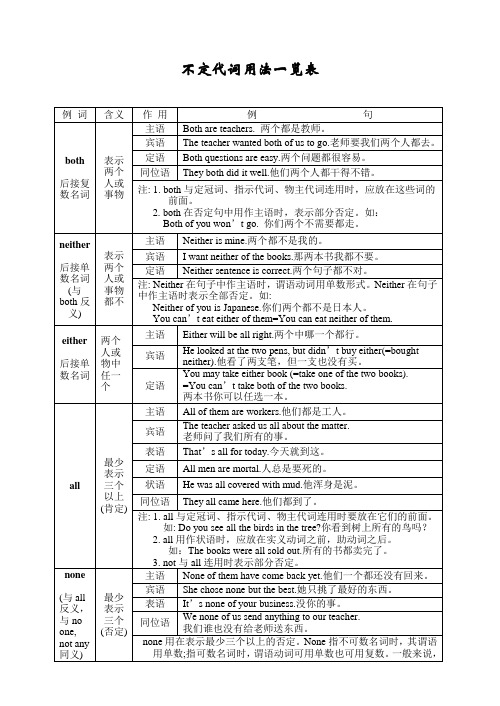
不定代词用法一览表不定代词不是指明代替任何特定名词的代词叫做不定代词。
常见的不定代词有all,both,each,every,some,any,many,much,(a)few,(a)little,one,ones,either,neither,other,another,no,none以及含有some-,any-,no-等的合成代词(如:anybody,something,no one)。
这些不定代词大都可以代替名词和形容词,在句中作主语、宾语、表语和定语。
但none和由some,any,no,every+thing,-body,-one构成的复合不定代同(如somebody等)只能作主语、宾语或表语;every和no只能作定语。
(这些词作定语时,有些语法书称之为形容词)下面我们把一些主要的不定代词用法归纳如下:one的用法1.one(一个),可以指人,也可以指物。
在句中可作主语、宾语和定语。
One should not praise oneself. 一个人不应炫耀自己。
(one作主语和宾语)If one wants to visit the city,one must find one’s own guide.如要参观这个城市,得自己找向导。
2.one,ones(one的复数形式)可用来代替前面出现过的少数名词,以避免重复。
Do you have a car?Yes,I have one. 你有一辆小汽车吗?是的,我有一辆。
I like small cars better than large ones. 我喜欢小汽车,不喜欢大汽车。
3.one的前面可用this,that,the,which等词修饰。
There are three pens,which one is yours,this one or that one or the one in the pencil-box?这儿有三支钢笔,哪一支是你的?这支?那支?还是在铅笔盒里的那支?4.a+形容词+one这一形式,经常见到或使用。
不定代词用法
不定代词用法(1) 不定代词与限定词不定代词又称不明确代词,是用来替代具体的人或物,代替先行词,用来表示一类人或物。
类型有:somebody(某人),anybody(任何人),everyone(每个人),no one(无人),anything(任何事),somthing(一些事)。
比如:Everybody loves peace.这里的everybody就是替代所有人的,它是一类人的代词。
限定词(determiner)和不定代词的功用都是替换先行词,但两者的差别是,限定词把一类人或物限定范围,例如某个人或某样物。
具体来讲,单数限定词包括 the(定冠词),a(不定冠词),an(不定冠词),this(这),that(那),my(我的),your(你的)。
复数限定词包括these(这些),those(那些),some(一些),few(几个),many(许多),both(两者),all(所有)。
比如:The doctor is helping the children.这里的the限定词把”医生“这种物范围限定成了一个,指示先行词doctor指代的是一位具体的人,而不是一类人,一类物。
(2) 不定代词与名词不定代词常常紧跟名词一起构成短语,表示一类或多类先行词。
有时不定代词替代先行词中的名词,有时又用作补充,在名词和形容词之间,用来确定这个名词指代什么。
比如:Give me something to read.这句话的something就是一类人或物的不定代词,来补充表示具体的读物,而不是吃物或看物。
(3) 不定代词与名词性短语不定代词与名词性短语在句子中也有不同的用法,例如:He has something to say.这里的something就是一类人或物的不定代词,来补充表示”要说的“,而不是具体的内容。
(4) 不定代词与不定式不定代词也可以和不定式一起构成短语,表示一类或多类的动作,主要有something to do,something to think,something to say等,比如:He has something to do.这里的something就是一类人或物的不定代词,来补充表示”要做的“,而不是具体的事情。
不定代词用法归纳总结知乎
不定代词用法归纳总结知乎(实用版)目录一、不定代词的定义与分类二、不定代词的用法1.作主语2.作宾语3.作表语4.作定语5.作状语三、不定代词的用法举例四、不定代词的注意事项正文一、不定代词的定义与分类不定代词是指在句子中代替名词或形容词的一类代词,它们的用法非常丰富。
不定代词可以分为很多种类,包括:something、somebody、someone、somewhere、anything、anybody、anyone、anywhere、nothing、nobody、noone、everything、everybody、everyone、everywhere、all、each、both、much、many、alittle、aew、others、another、none、one、either、neither 等。
二、不定代词的用法1.作主语:不定代词可以作为句子的主语,例如:“Both of us are right.”(我们两人都对。
)2.作宾语:不定代词也可以作为句子的宾语,例如:“There is roomfor all of us.”(我们所有的人全坐得下。
)3.作表语:不定代词可以作为句子的表语,例如:“That"s nothing.”(没什么。
)4.作定语:不定代词可以作为句子的定语,例如:“You may take either road.”(两条路你走哪条都行。
)5.作状语:不定代词可以作为句子的状语,例如:“I can"t find my book anywhere.”(我在任何地方都不能找到我的书。
)三、不定代词的用法举例以下是一些不定代词在句子中的实际用法举例:- Both of them are teachers.(他们两人都是教师。
)- I know nothing about this person.(我对这个人一无所知。
)- This book is too much difficult for a child.(这本书对一个小孩来说太难了。
常见不定代词的用法归纳小结
常见不定代词的用法归纳小结
常见不定代词的用法归纳如下:
some 一些,某些,某个,一些人,某些人,某个地方。
作主语表示复数。
any 一些,任何,任一的。
可修饰不可数名词或复数名词,也可修饰不可数名词或单数可数名词的一般疑问句。
no 不,没有。
表示否定。
修饰不可数名词或单数可数名词。
every 每个,每一的,一切的,所有的人或物。
修饰单数可数名词。
作主语表示复数。
each 每个,各,各自。
修饰单数可数名词。
作主语表示复数。
another 又一个,再一个。
指三个中的任意两个或每组中的任意一个另外的。
修饰单数可数名词。
the other 指其余的人或物。
常与one连用。
指两个中的另一个。
others 泛指其他的人或物。
前面不能加定冠词。
后面常与介词in等连用。
相当于the other+复数名词。
else 其他的,另外的。
放在所修饰词之后。
完整版)不定代词用法总结
完整版)不定代词用法总结不定代词的用法一、不定代词some和any的用法区别一般来说,some用于肯定句中,而any用于否定句和疑问句中。
但是,在表示请求、邀请或征求意见的句子中,通常要用some而不用any,例如:Would you like some cake。
你想吃点蛋糕吗?Why not buy some bread。
为什么不买些面包呢?Shall I get some chalk for you。
要我帮你拿些粉笔来吗?需要说明的是,有时候any也用于肯定句中,此时表示“任何”,例如:Any colour will do。
任何颜色都可以。
Come any day you like。
你随便哪天来都可以。
二、不定代词many和much的用法以及区别不定代词many和much都表示“许多”,但many修饰或代替可数名词(复数),与few(少数)相对;而much用来修饰或代替不可数名词(单数),与little(少量)相对。
在口语中,两者主要用于非肯定句中,例如:Did you see many people there。
你在那儿看见许多人了吗?We don’t have much time。
我们没有许多时间。
XXX work has been done。
许多工作都已经做了。
You’ve given me too much。
你给我太多了。
Take as many (much) as you want。
你要多少拿多少。
I asked her a great many ns。
我问了她许多问题。
另外需要注意的是,too much可以作副词或代词,也可以用作形容词修饰不可数名词,例如:Is watching TV too much good or bad for your health。
看电视太多对你的健康有益还是有害?You’ve given me too much。
你给我的太多了。
We’ve had too much rain lately。
- 1、下载文档前请自行甄别文档内容的完整性,平台不提供额外的编辑、内容补充、找答案等附加服务。
- 2、"仅部分预览"的文档,不可在线预览部分如存在完整性等问题,可反馈申请退款(可完整预览的文档不适用该条件!)。
- 3、如文档侵犯您的权益,请联系客服反馈,我们会尽快为您处理(人工客服工作时间:9:00-18:30)。
不定代词用法归纳(详细讲解)■本站特约作者陈根花一、不定代词概说英语的不定代词有 all, each, both, either, neither, one, none, little, few, many, much, other, another, some, any, no, (a) few, (a) little, both, enough, every 等,以及由 some, any,no 和 every 构成的合成代词(即somebody, anyone, nothing 等)。
在这些不定代词中,多数都能作主语、宾语、表语或定语,但是代词 none 以及由 some, any, no 和 every 构成的合成代词只能作主语、宾语或表语,不能作定语,而 no 和 every 则只用作定语。
二、指两者和三者的不定代词有些不定代词用于指两者(如both, either, neither),有的不定代词用于指三者(如all, any, none, every),注意不要弄混:Both of my parents are doctors. 我的父母都是医生。
All of the students are interested in it. 所有的学生对此都很感兴趣。
There are trees on any side of the square. 广场的每一边都种有树。
He has two sons, neither of whom is rich. 他有两个儿子,都不富有。
He has three sons, none of whom is rich. 他有三个儿子,都不富有。
【说明】each 可用于两者、三者或三者以上,而 every 只用于三者或三者以上,因此用于两者时只能用 each,不能用 every。
如不能说 There are trees on every side of the road.三、复合不定代词的用法特点复合不定代词包括 something, somebody, someone, anything, anybody, anyone, nothing, nobody, no one, everything, everybody, everyone 等。
它们在句中可用作主语、宾语或表语,但不能用作定语。
something, someone 等和 anything, anyone等的区别与 some 和 any 的区别一样,前者一般用于肯定句,后者一般用于否定句、疑问句或条件句(参见 any & some)。
具体使用时应注意以下几点:1.复合不定代词受定语修饰时,定语应放在它们后面:There is nothing wrong with the radio. 这收音机没有毛病。
Have you seen anyone [anybody] famous? 你见过名人吗?2.指人的复合不定代词若用作主语,其谓语动词一般用单数,相应的人称代词和物主代词也用单数 he, him, his (不一定指男性)。
但在非正式文体中常用复数代词 they, them, their:Everyone knows this, doesn’t he [don’t they]?人人都知道这一点,不是吗?If anybody [anyone] comes, ask him [them] to wait. 要是有人来,让他等着。
3.指事物的复合不定代词若用作主语,谓语动词只能用单数,相应的人称代词也只能用 it,而不用 they:Everything is ready, isn’t it?一切都准备好了,是吗?4.不定代词 anyone, everyone 等只能指人,不能指物,且其后一般不接of 短语。
若是指物或后接 of 短语,可用 any one, every one (分开写):any one of the boys (books) 孩子们(书)当中的任何一个(本)every one of the students (schools) 每一个学生(一所学校)四、不定代词any与not连用——是any not 还是 not any按英语习惯,any 以及含有any的复合不定代词用于否定句时,它只能出现在否定词之后,而不能在否定词之前:误:Any one doesn’t know how to do it.正:No one knows how to do it. 任何人都不知道如何做它。
误:Anybody [Anyone] cannot do it.正:Nobody [No one] can do it. 这事谁也干不了。
误:Anything cannot prevent me from going.正:Nothing can prevent me from going. 什么也不能阻挡我去。
五、不定代词与部分否定不定代词all, both, every 等与 not 连用时构成部分否定;若要表示完全否定,则需换用 none, neither, no one等。
比较:All of the students like the novel. 所有这些学生都喜欢这本小说。
Not all of the students like the novel. 并不是所有这些学生都喜欢这本小说。
All of the students don’t like the novel.并不是所有这些学生都喜欢这本小说。
None of the students like the novel. 这些学生当中没有一个喜欢这本小说。
六、不定代词all, both, each 等用作同位语不定代词all, both, each 等若用作主语同位语,主语可以是名词或代词;若用作宾语等其他成分的同位语,则宾语等成分必须是人称代词,而不能是名词:We have all read it. 我们都读过他。
(all 修饰的主语是代词)The villages have all been destroyed. 村庄都被毁了。
(all 修饰的主语是名词)They told us all to wait there. 他叫我们都在那儿等。
(all 修饰的宾语是代词)但不能说:They told the men all to wait there. (all 修饰的宾语是名词不是代词)七、不定代词so little 与 such little的区别用so little 还是such little 取决于不定代词little 的意思:若表示数量方面的“少”,则用so little;若表示形状体积的“小”,则用such little:He has so little time for reading. 他读书的时间少得可怜。
I’ve never seen such little boxes.我从未见过那样小的盒子。
八、不定代词some 与 any 的用法区别一般说来,不定代词 some 用于肯定句中,any 用于否定句和疑问句中。
但是,在表示请求、邀请或征求意见的句子中,通常要用 some 而不用any:Would you like some cake? 吃点蛋糕吗?Why not buy some bread? 为什么不买些面包呢?Shall I get some chalk for you? 要我帮你拿些粉笔来吗?【说明】不定代词any 有时也用于肯定句中,此时表示“任何”:Any colour will do. 任何颜色都行。
Come any day you like. 随便哪天来都可以。
九、不定代词many 与 much 的用法区别不定代词 many 和much 都表示“许多”,但 many 修饰或代替可数名词(复数),与 few(少数)相对;而 much 用来修饰或代替不可数名词(单数),与little(少量)相对。
在口语中两者主要用于非肯定句中:Did you see many people there? 你在那儿看见许多人了吗?We don’t have much time.我们没有许多时间。
在肯定句中,一般用 a lot of, lots of, plenty of 等代之。
但在正式文体中有时也用于肯定句中;另外,若用作主语或主语的定语,或其前有 how, too, as, so, a good, a great 等修饰,也可用于肯定句中:Many of us left early. 我们有许多人离开得很早。
Much work has been done. 许多工作都已经做了。
You’ve given me too much.你已给我太多了。
Take as many (much) as you want. 你要多少拿多少。
I asked her a great many questions. 我问了她许多问题。
十、不定代词few, a few 与 little, a little的用法区别1.不定代词 few 和 a few 后接可数名词的复数形式。
few 表示数量很少或几乎没有,强调“少”,含有否定意义;a few 表示数量虽然少但毕竟还有,强调“有”,含有肯定意义:It is very difficult, and few people understand it. 它很难,没有几个人能懂。
It is very difficult, but a few people understand it. 他虽难,但是有些人懂。
2. little 和 a little 之后接不可数名词,其区别跟 few 和 a few 之间的区别相似:Unfortunately, I had little money on me. 很不巧,我身上没带什么钱。
Fortunately, I had a little money on me. 幸好我身上带着一点钱。
